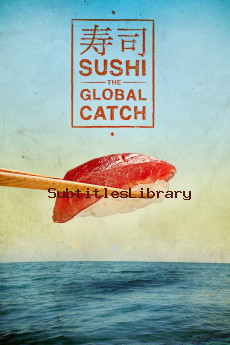Movies Listings by Genre News on Subtitleslibrary
-
From humble beginnings as a simple food sold by Japanese street vendors, sushi has exploded into an international phenomenon in the past 30 years. SUSHI: THE GLOBAL CATCH is a feature-length documentary shot in five countries exploring the history, problems and future of this popular cuisine. Much of sushi's rich cultural tradition that began in Tokyo is changing as raw fish now appear from cities like Warsaw and New York to small towns worldwide. But what is the cost? Will the worldwide hunger for sushi continue to grow until wild fish vanish, or will new technology like aquaculture keep plates full? Can sustainable sushi restaurants satisfy consumers or will competition for declining resources drive prices so high that only a few can afford raw fish? ?Sakana Films
-
A story about greed, politics and the land grab of the century, ZIPPER chronicles the battle over an American cultural icon. Small-time ride operator, Eddie Miranda, proudly operates a carnival contraption called the Zipper in the heart of Coney Island's gritty amusement district. When his rented lot is snatched up by a real estate mogul, Eddie and his ride become casualties of a power struggle between the developer and the City of New York over the future of the world-famous destination. Be it an affront to history or simply the path of progress, the spirit of Coney Island is at stake. In an increasingly corporate landscape, where authenticity is often sacrificed for economic growth, the Zipper may be just the beginning of what is lost. ?Amy Nicholson
-
Ana Nogueira is a white South African and Eron Davidson a Jewish Israeli. Drawing on their first-hand knowledge of the issues, the producers take a close look at the apartheid comparison often used to describe the Israeli-Palestinian conflict. Their film breaks down the rhetorical analogy into a fact-based comparison, noting where the analogy is useful and appropriate, and where it is not. There are many lessons to draw from the South African experience relevant to conflicts all over the world. This film is as much a historical document of the rise and fall of apartheid, as it is a film about why many Palestinians feel they are living in an apartheid system today, and why an increasing number of people around the world agree with them. ?Anonymous
-
AMERICAN COUP tells the story of the first coup ever carried out by the CIA - Iran, 1953. Explores the blowback from this seminal event, as well as the coup's lingering effects on the present US-Iranian relationship. Includes a segment on the 1979 Iranian Hostage Crisis and its relation to the 1953 coup. Concludes with a section on the recent Iranian presidential election. Contains interviews with noted Middle East experts and historians and prominent public figures such as Stephen Kinzer (author, All The Shah's Men), Prof. Ervand Abrahamian, Trita Parsi, Col. Lawrence Wilkerson, Ted Koppel and Rep. Ron Paul of Texas. With Iranian cinematography by James Longley. ?Anonymous
-
Cast: Oprah Winfrey
The current method of raw food production is largely a response to the growth of the fast food industry since the 1950s. The production of food overall has more drastically changed since that time than the several thousand years prior. Controlled primarily by a handful of multinational corporations, the global food production business - with an emphasis on the business - has as its unwritten goals production of large quantities of food at low direct inputs (most often subsidized) resulting in enormous profits, which in turn results in greater control of the global supply of food sources within these few companies. Health and safety (of the food itself, of the animals produced themselves, of the workers on the assembly lines, and of the consumers actually eating the food) are often overlooked by the companies, and are often overlooked by government in an effort to provide cheap food regardless of these negative consequences. Many of the changes are based on advancements in science and ...
-
Cast: Ben Mendelsohn, James Gandolfini, Richard Jenkins, Ray Liotta
Three amateurs stickup a Mob protected card game, causing the local criminal economy to collapse. Brad Pitt plays the hitman hired to track them down and restore order. ?Anonymous
-
Cast: Barack Obama
Dirty Wars follows investigative reporter Jeremy Scahill, author of the international bestseller Blackwater, into the hidden world of America's covert wars, from Afghanistan to Yemen, Somalia, and beyond. Part action film and part detective story, Dirty Wars is a gripping journey into one of the most important and underreported stories of our time. What begins as a report on a deadly U.S. night raid in a remote corner of Afghanistan quickly turns into a global investigation of the secretive and powerful Joint Special Operations Command (JSOC). As Scahill digs deeper into the activities of JSOC, he is pulled into a world of covert operations unknown to the public and carried out across the globe by men who do not exist on paper and will never appear before Congress. In military jargon, JSOC teams "find, fix, and finish" their targets, who are selected through a secret process. No target is off limits for the "kill list," including U.S. citizens. ?Anonymous
-
The documentary follows social worker Dan Cohen, founder of the nonprofit organization Music & Memory, as he fights against a broken health-care system to demonstrate music's ability to combat memory loss and restore a deep sense of self to those suffering from it. Rossato-Bennett visits family members who have witnessed the miraculous effects of personalized music on their loved ones, and offers illuminating interviews with experts including renowned neurologist and best-selling author Oliver Sacks (Musicophilia: Tales of Music and the Brain) and musician Bobby McFerrin ("Don't Worry, Be Happy"). ?-Bond/360
-
Cast: Kelsey Grammer, Paul Newman, John Lithgow, Nancy Reagan
'Best of Enemies' is a documentary about the legendary series of nationally televised debates in 1968 between two great public intellectuals, the liberal Gore Vidal and the conservative William F. Buckley Jr. Intended as commentary on the issues of their day, these vitriolic and explosive encounters came to define the modern era of public discourse in the media, marking the big bang moment of our contemporary media landscape when spectacle trumped content and argument replaced substance. 'Best of Enemies' delves into the entangled biographies of these two great thinkers and luxuriates in the language and the theater of their debates, begging the question, 'What has television done to the way we discuss politics in our democracy today?'
-
Cast: Whoopi Goldberg, James Earl Jones, Robert Carradine, Gabriela Cowperthwaite
Notorious killer whale Tilikum is responsible for the deaths of three individuals, including a top killer whale trainer. Blackfish shows the sometimes devastating consequences of keeping such intelligent and sentient creatures in captivity. ?Anonymous
-
Cast: Valorie Curry, Callie Hernandez, Brandon Scott, Corbin Reid
After unearthing a DV tape containing intriguing raw footage in Burkittsville's Black Hills Forest, Lane and Talia upload the video on YouTube. Then, James stumbles upon the video, and--believing that he saw an image of his missing sister, Heather, who disappeared in 1994 in the same woods while investigating the legend of the Blair Witch--he assembles a team of friends in search of answers. Convinced that she is still alive, he heads into the gloomy forest accompanied by his friend Peter; Peter's girlfriend, Ashley; the film student, Lisa, and the pair of uploaders, only to go astray in the heart of a green maze. Now, more and more, as James and his team find themselves trapped in the epicentre of the evil activity, the blood-curdling legend of the wicked sorceress seems real. Can they escape from the wrath of the demonic Blair Witch? ?Nick Riganas
-
Through the stories of workers and entrepreneurs in the U.S. and China, Catching the Sun captures the global race to lead the clean energy future. Over the course of a solar jobs training program, Catching the Sun follows the hope and heartbreak of unemployed American workers seeking jobs in the solar industry. With countries like China investing in innovative technologies and capitalizing on this trillion-dollar opportunity, Catching the Sun tells the story of the global energy transition from the perspective of workers and entrepreneurs building solutions to income inequality and climate change with their own hands. Their successes and failures speak to one of the biggest questions of our time: will the U.S. actually be able to build a clean energy economy? ?Shalini Kantayya
-
Cast: Bill Clinton, Charlie Rose
In the early years of the AIDS epidemic, the disease was considered a death sentence affecting communities, like the LGBT ones, whom many in power felt deserved it. This film tells the story of how militant activists like ACT-UP and TAG pushed for a meaningful response to this serious public health problem. As the activists struggled against political indifference, religious hostility, corporate greed and apparently skewed scientific research priorities with determination and sheer audacity, they produced a political wave that would lead to not only an effective treatment regime, but would advance LGBT rights beyond anyone's expectations. ?Kenneth Chisholm ([email protected])
-
Cast: Ashly Burch
Explores how our culture's narrow definition of masculinity is harming our boys, men and society at large and unveils what we can do about it. ?Anonymous
-
Cast: Russell Hodgkinson, Pisay Pao
A Wiki-Leaks release illuminates the collusion among politicians and the medical industry that drives the cost of medical care to an unattainable price for the middle class. With the guilty parties' names and addresses being released, a vigilante movement springs up around the United States. After his father loses the battle with cancer, Mason, along with Thompson and Bobbi, seek violent justice and hope for riches along the way. A shotgun blast sparks a string of unintended consequences that leads the group down a dark road. ?Domenic Barbero
All images and subtitles are copyrighted to their respectful owners unless stated otherwise. This website is not associated with any external links or websites. ©subtitleslibrary.com







